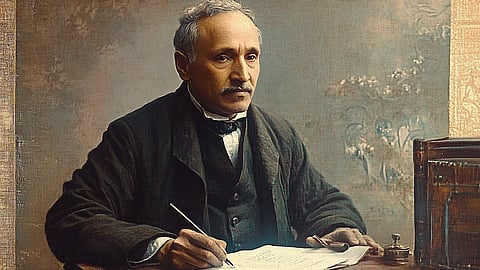- Commentary
- History Vignettes
- Notes on Culture
- Dispatches
- Podcasts
- Indian LanguagesIndian Languages
- Support

THE FOLLOWING IS THE FULL TEXT of Acharya Jadunath Sarkar’s brilliant essay published in July 1915 in the Modern Review. He was forty-five years old and at the peak of his powers, having published all the five volumes of his authoritative history of Aurangzeb among other lasting works of historical scholarship.
This essay offers the firsthand perspective of the Acharya’s prowess not just as a historian but a teacher of the highest order. This aspect of the Acharya’s legacy is rather little-known and it is only fitting that we hear him speak from direct experience.
Among other things, the essay opens up a lost and forgotten world of the exacting academic standards that existed more than a century ago in India.
In this paper, my intention is to discuss the case of the ordinary students, the average Pass man and those below them, forming the lower half of a class arranged in the order’of merit. My remarks do not apply to our best boys—about one-tenth of a class,— who may be left to their own devices and would, in the words of Pandit Ishwar Chandra Vidyasagar, “come out in the first division, even if they were let loose in a wilderness,' instead of being trained in a college.”
I also exclude a fairly large number who, without being tip-top scholars, take a genuine interest in History and keep up their study and discussion of the subject far into life,—generally using their mother tongue for the purpose. Their number varies in different Colleges, being about 40 p.c. in the better sort of institutions, and a quarter or even less in the lower type of Colleges which admit pupils without any selection. My remarks are also subject to the qualification that in Bengal many of our students read at home a very large number of vernacular books of value and thus supplement their college teaching.
EVERY earnest teacher of History in Indian Colleges asks himself, how to infuse life and reality into the teaching of the subject, how to give our boys true knowledge and not merely load their memory with a bundle of dry facts for a temporary end? In the case of history, we have a further complication of the general educational problem of devising means for making the student do his own work instead of the teacher removing all his difficulties and saving him labour, and thereby rendering him intellectually helpless. How can our boys be trained to be self-reliant, to know where to look for information and how to put that information to rational use ? How can we make the knowledge, imparted to them by us truly their own possession so that they may apply it to the problems of life?
The difficulties in the path of achieving this ideal are many, as every one with experience of Indian Colleges knows very well. First, and foremost, our boys have to attend lectures and write answers in an alien tongue of which the immense majority of our freshmen have no such mastery as breeds confidence and facility in using it. This makes it a laborious task for them to read English books extensively for gathering information; they cannot do it with ease or for pleasure, unlike students who are born to the language. Their limited power of English composition makes it practically impossible for them to express themselves in their own words freely. They are driven to reproduce other men’s language because they are notsure of their own English.
This unnatural arrangement of Oriental boys having to read and write in a foreign and imperfectly acquired tongue, is responsible for a twofold mischief: the meagre acquisition of knowledge from books by our students and the inadequate expression in writing of what they do acquire.
Secondly, the environment which makes European, history easily intelligible to the English lad is wanting in India. “Constitution,” “democracy,” “popular representation,” “the factory system,” “peasant-proprietorship,” “ministerial responsibility,” “the upper chamber,” “the State-Church,” etc., are things with a familiar meaning to the English lad; but they are entirely outside the Indian student’s range of experience; he never meets with their use in the society around himself, but has to learn their meaning by painful effort.
The evil is aggravated by the burden of too many subjects and too ambitious a syllabus, which some of our Universities have thought fit to lay down for their examinations. A large number of books, usually of an advanced nature, are prescribed, which nobody with any real knowledge of Indian academic conditions can expect the average student to read lor himself or (in some cases) to understand without frequent assistance. The excessive number and weight of text-books necessarily makes the teacher deliver not lectures, but an outline sketch of the subject, while the student is driven to trust for his salvation to some printed epitome or his professor’s notes.
Lastly, the standard of teaching history has suffered from the neglect of the subject by the authorities of nearly all our colleges. The worst-paid teachers (excluding pandits and maulvis) being employed in the work and very poor equipment in respect of books, maps and models being provided even in our richest colleges. As Mr. N.N. Ghosh, Principal, Metropolitan Institution, once wrote in sorrow, “Almost every body is considered fit lecture on history.”
Where lies the remedy?
To be continued
The Dharma Dispatch is now available on Telegram! For original and insightful narratives on Indian Culture and History, subscribe to us on Telegram.
